The man behind the pseudonym Banksy is undoubtedly the world’s most celebrated and elusive guerrilla street artist. And now over 160 works of his have been re-created in a life-size, re-imagined space that reflects the street experience. Welcome to the New York Banksy Museum.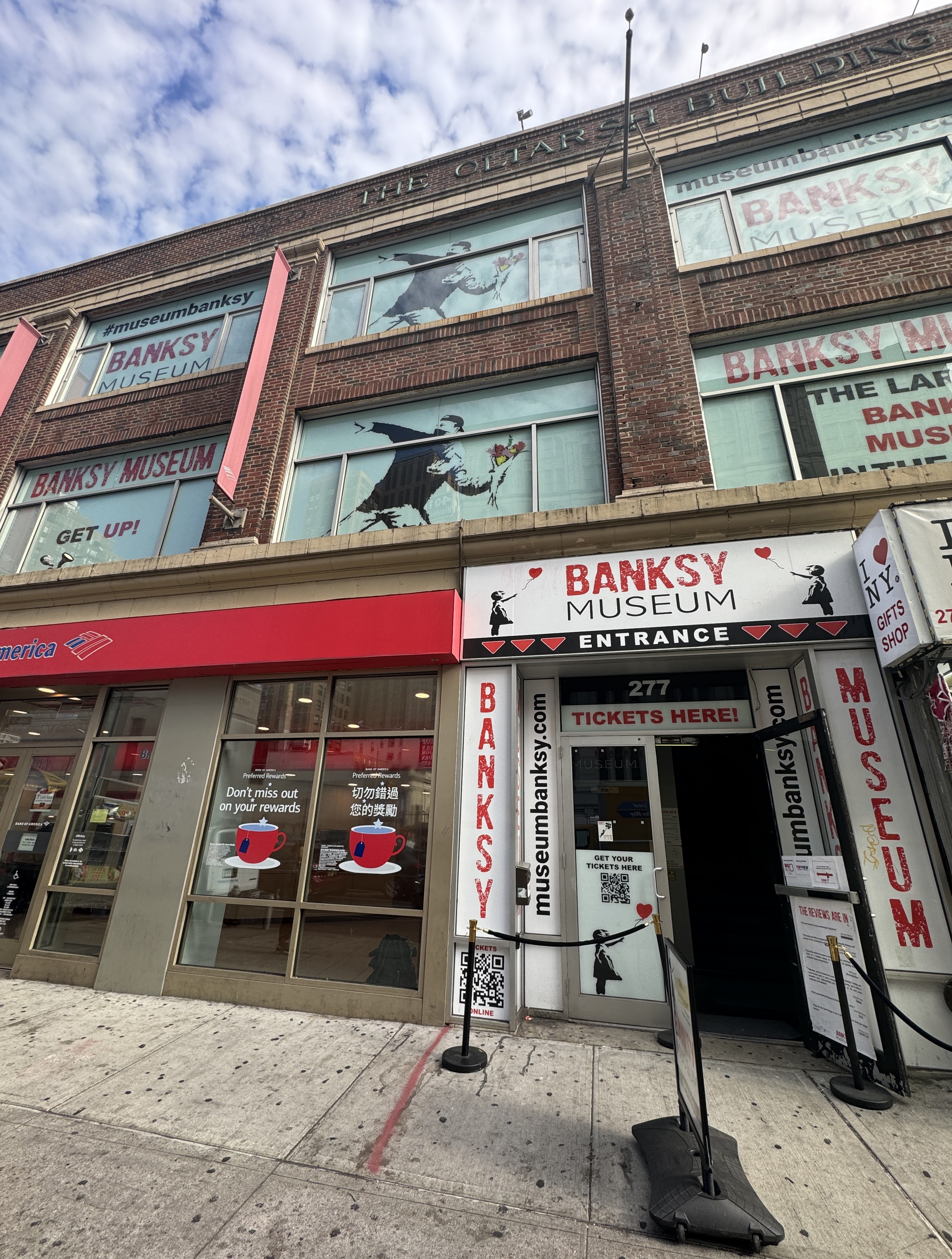 The museum opened in spring of this year and offers visitors an immersive journey, with access to Banksy creations, many of which have long since been whitewashed, destroyed, dismantled and/or sold to private galleries and collectors.
The museum opened in spring of this year and offers visitors an immersive journey, with access to Banksy creations, many of which have long since been whitewashed, destroyed, dismantled and/or sold to private galleries and collectors.
The exhibition gives Banksy’s work a new lease of life. To do this, the museum’s team employed a cadre of anonymous street artists, who recreated the work in a “magnificent reflection of Banksy’s energy, defiance and raw talent.” And the level of detail and authenticity they achieved is impressive.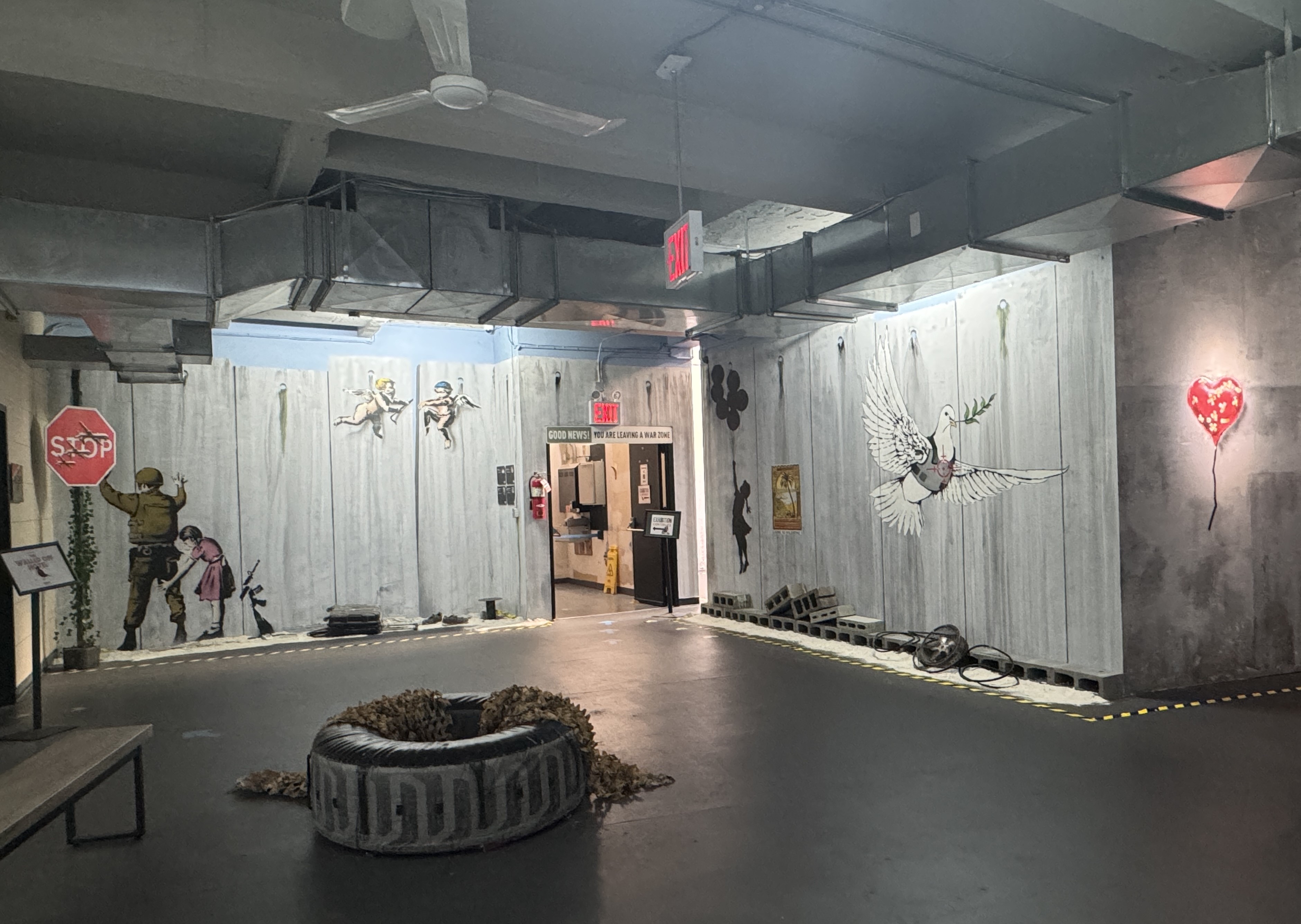 These reproductions are made to appear like they’re on exterior walls of buildings, designed to resemble a street atmosphere. There’s a fake manhole cover, artfully-arranged debris here and there and the surfaces are fabricated to look like brick or concrete. The goal is to make viewers feel as if they’ve just happened upon a Banksy graffiti in its natural setting, while roaming the streets of NYC, Paris or London.
These reproductions are made to appear like they’re on exterior walls of buildings, designed to resemble a street atmosphere. There’s a fake manhole cover, artfully-arranged debris here and there and the surfaces are fabricated to look like brick or concrete. The goal is to make viewers feel as if they’ve just happened upon a Banksy graffiti in its natural setting, while roaming the streets of NYC, Paris or London.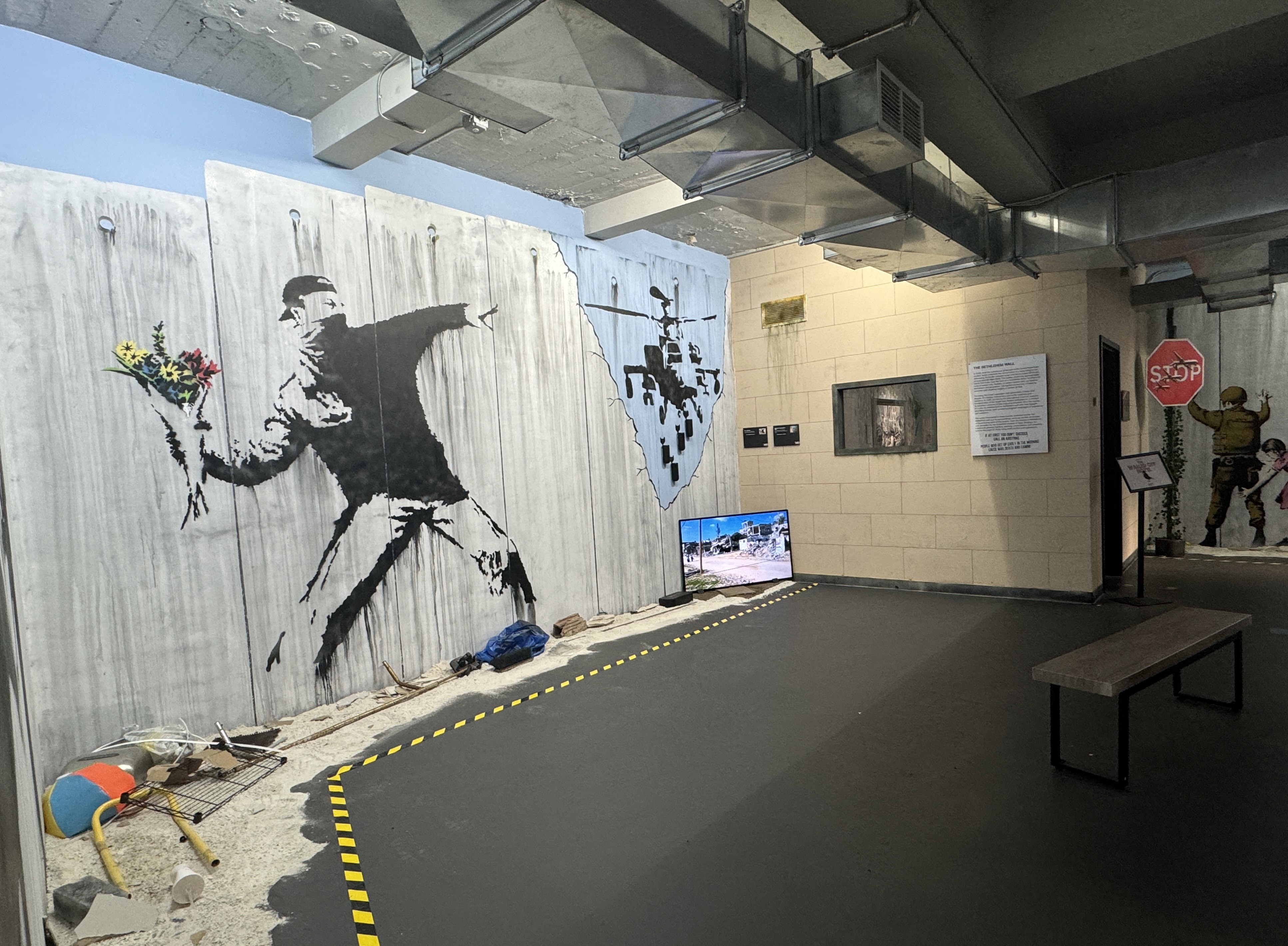 It’s important to note that the exhibit is displaying Banky’s art without his permission. He has categorically denounced any use of his art for profit, as he rejects the commercialization of art. As expected, the unauthorized nature of the museum has sparked controversy. Critics argue that replicating the work indoors and charging a fee alters the meaning of the art and possibly undermines the artist’s original intent of free public access.
It’s important to note that the exhibit is displaying Banky’s art without his permission. He has categorically denounced any use of his art for profit, as he rejects the commercialization of art. As expected, the unauthorized nature of the museum has sparked controversy. Critics argue that replicating the work indoors and charging a fee alters the meaning of the art and possibly undermines the artist’s original intent of free public access.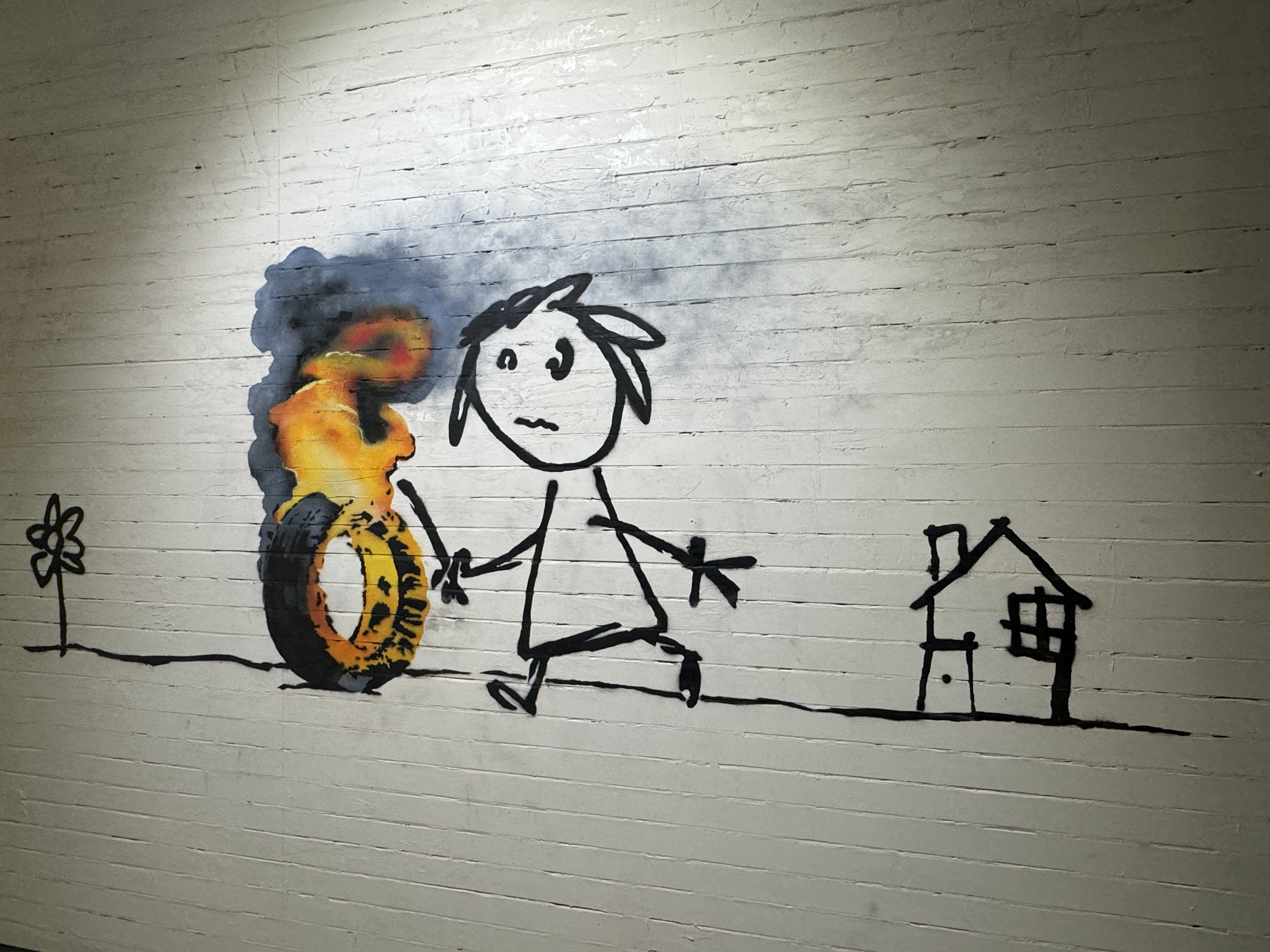 The museum’s founder, Hazis Vardar has reportedly said he isn’t concerned about the artist’s lack of involvement. He mentions that street art is transient and difficult to preserve, especially because these are works that were never meant to be permanent. His view is that the museum provides a way to preserve the art for the public to enjoy.
The museum’s founder, Hazis Vardar has reportedly said he isn’t concerned about the artist’s lack of involvement. He mentions that street art is transient and difficult to preserve, especially because these are works that were never meant to be permanent. His view is that the museum provides a way to preserve the art for the public to enjoy.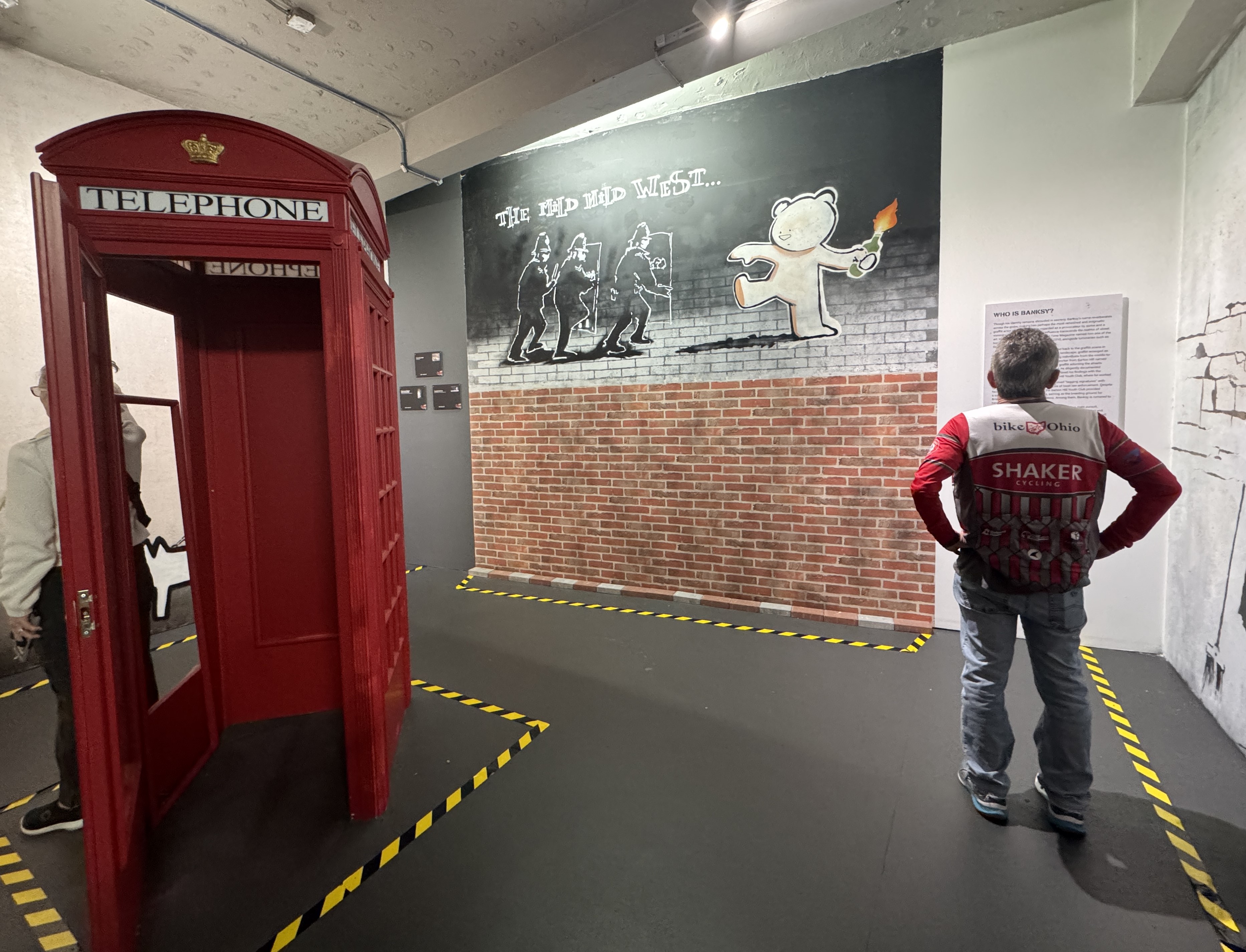 Banksy first got noticed for spray-painting trains and walls in his home city of Bristol, England during the early 90s. But, because graffiti and street art can be regarded as criminal damage, those in the art market surmise he remained anonymous because he didn’t want to mess with the law. But this anonymity is also one of the reasons he’s become so popular and why his work fetches millions of dollars. If the mystique is destroyed, perhaps some of the value of his art would decrease.
Banksy first got noticed for spray-painting trains and walls in his home city of Bristol, England during the early 90s. But, because graffiti and street art can be regarded as criminal damage, those in the art market surmise he remained anonymous because he didn’t want to mess with the law. But this anonymity is also one of the reasons he’s become so popular and why his work fetches millions of dollars. If the mystique is destroyed, perhaps some of the value of his art would decrease.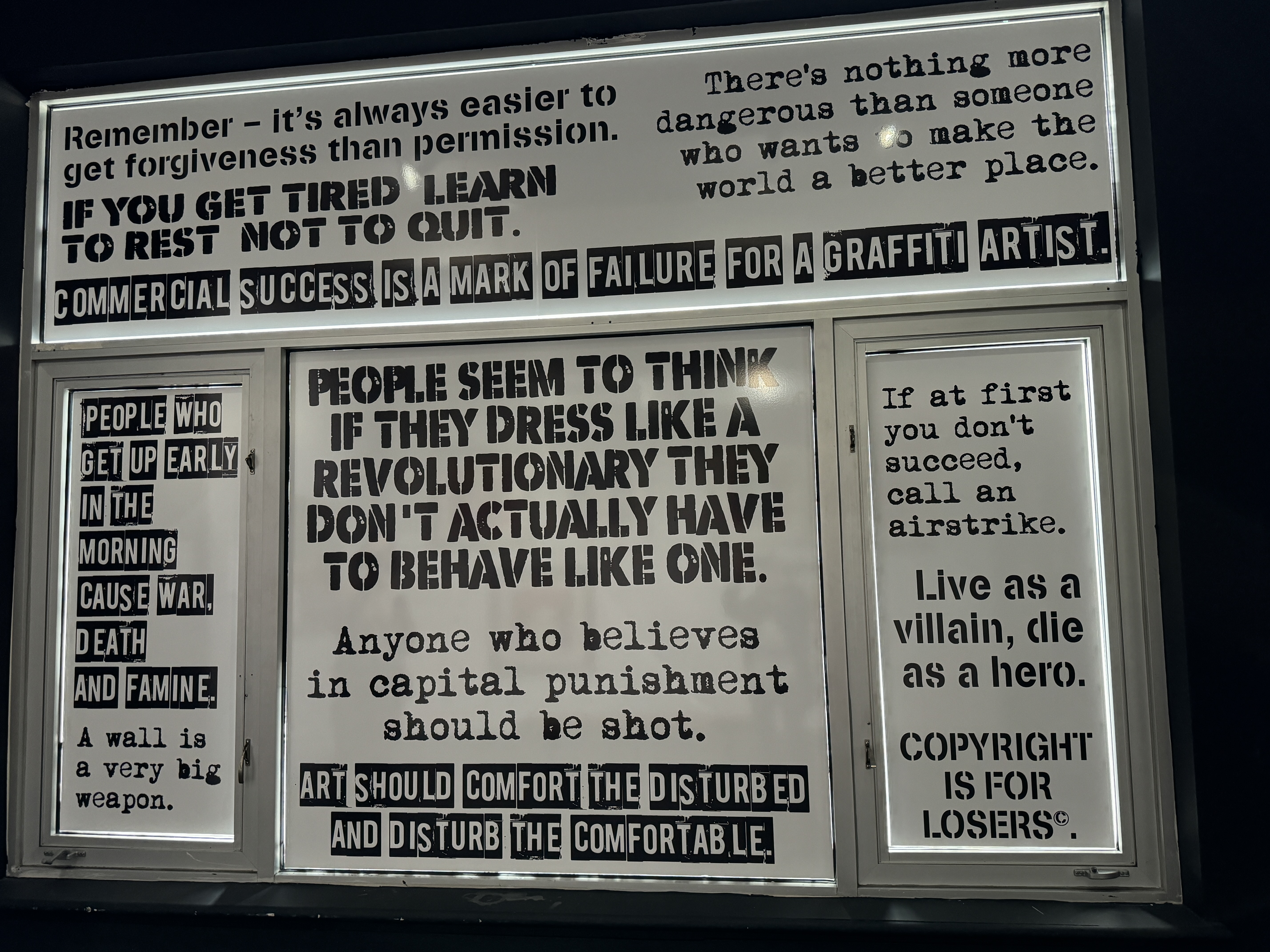 Though Banksy took some art classes in college, he learned his trade on the streets and first painted under the name Robin Banx. Early on, he was influenced by a French graffiti artist called Blek le Rat, who is considered to be the father of stencil graffiti. You can see Blek le Rat’s style in much of Banky’s work. And like Blek le Rat, Banksy, too, eventually shifted from free-hand spray painting to stencils to increase efficiency, as well as to create more dynamic imagery.
Though Banksy took some art classes in college, he learned his trade on the streets and first painted under the name Robin Banx. Early on, he was influenced by a French graffiti artist called Blek le Rat, who is considered to be the father of stencil graffiti. You can see Blek le Rat’s style in much of Banky’s work. And like Blek le Rat, Banksy, too, eventually shifted from free-hand spray painting to stencils to increase efficiency, as well as to create more dynamic imagery.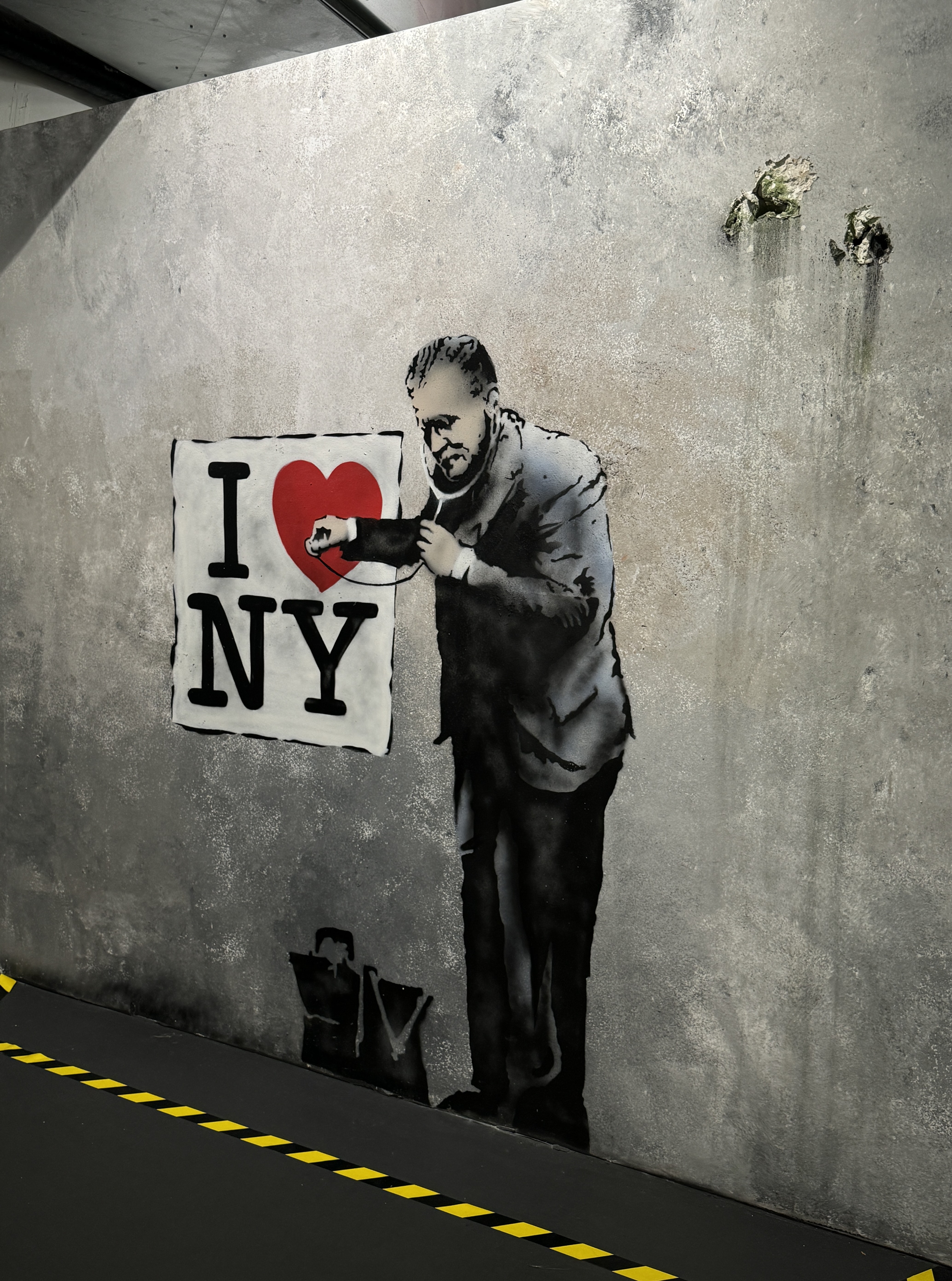 Banksy has produced countless attention-grabbing images and installations over his decades-long career. Many of them offer critical commentary on social, political and cultural issues, and are meant to be thought-provoking. The artist is not afraid to address such themes as war, capitalism, freedom, identity and surveillance. And he often uses children and youthful figures to express his feelings on global injustices.
Banksy has produced countless attention-grabbing images and installations over his decades-long career. Many of them offer critical commentary on social, political and cultural issues, and are meant to be thought-provoking. The artist is not afraid to address such themes as war, capitalism, freedom, identity and surveillance. And he often uses children and youthful figures to express his feelings on global injustices.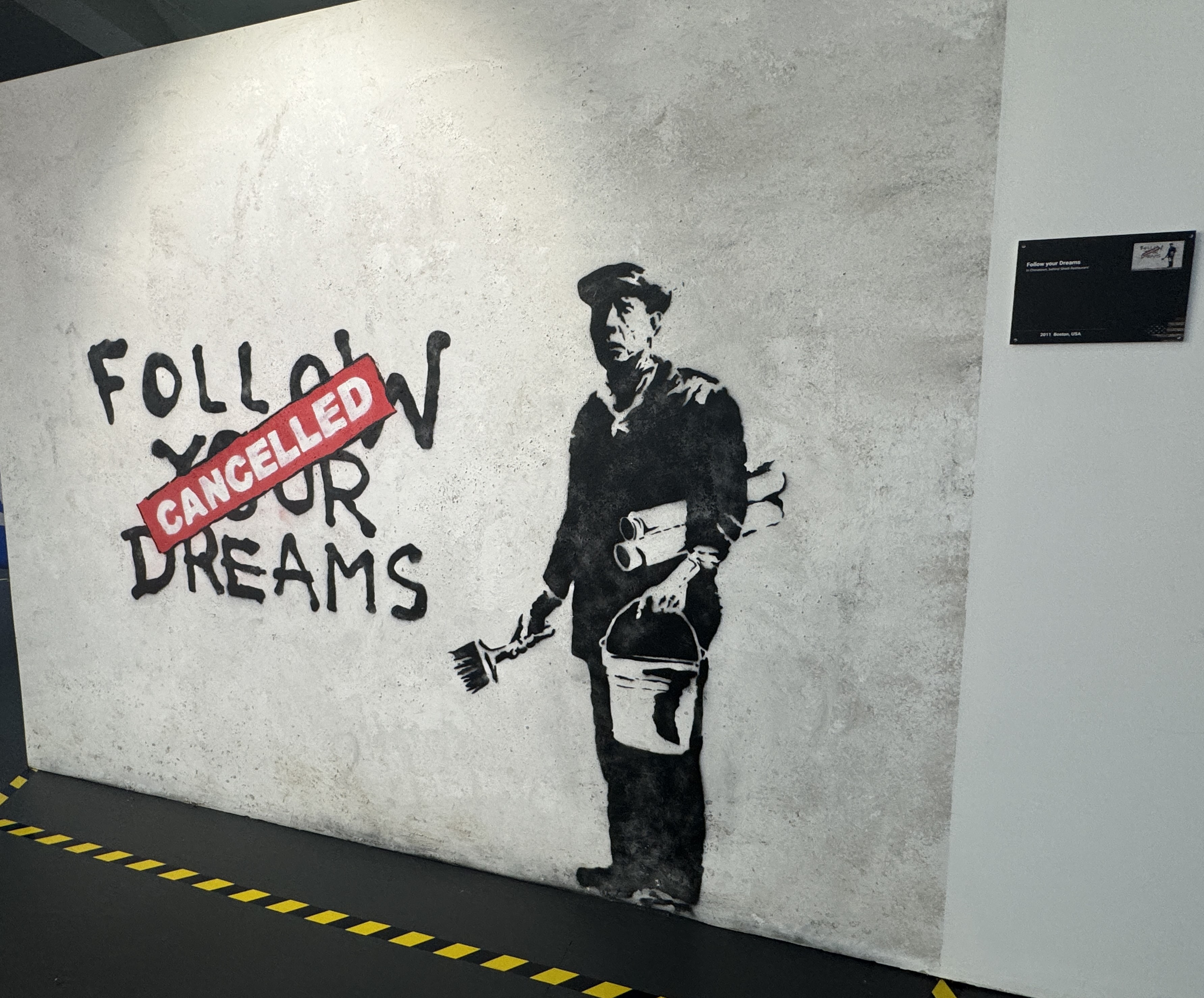 Stepping inside the museum, you’ll immediately be transported into Banksy’s world. You’ll see some of his most iconic works, like “Girl with Balloon,” Kissing Coppers,” “Follow Your Dreams – Cancelled,” “No Future,” “Sweep it Under the Carpet,” “ Stop and Search,” “Hula Hoop Girl” and “Flower Thrower,” among others.
Stepping inside the museum, you’ll immediately be transported into Banksy’s world. You’ll see some of his most iconic works, like “Girl with Balloon,” Kissing Coppers,” “Follow Your Dreams – Cancelled,” “No Future,” “Sweep it Under the Carpet,” “ Stop and Search,” “Hula Hoop Girl” and “Flower Thrower,” among others.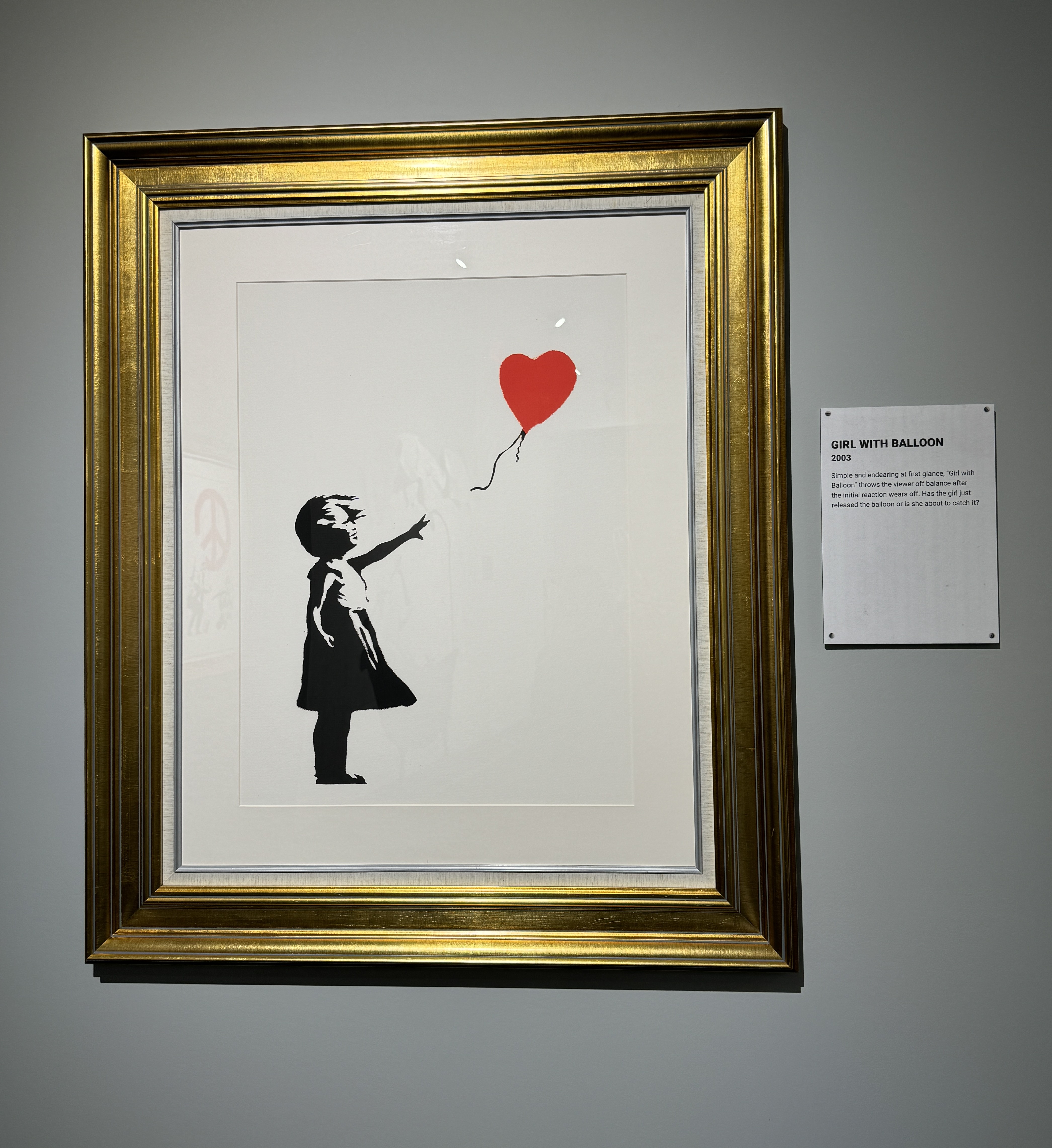 Of these, “Girl with Balloon” is perhaps the most famous. Here, a girl is reaching for a heart-shaped balloon, just out of her grasp. Is she losing the balloon or is she just about to catch it? Many comment that it is a metaphor for hope, love and freedom.
Of these, “Girl with Balloon” is perhaps the most famous. Here, a girl is reaching for a heart-shaped balloon, just out of her grasp. Is she losing the balloon or is she just about to catch it? Many comment that it is a metaphor for hope, love and freedom.
Another, “Follow Your Dreams – Cancelled” is striking in its message that it’s not worth it to chase our dreams because they never come true.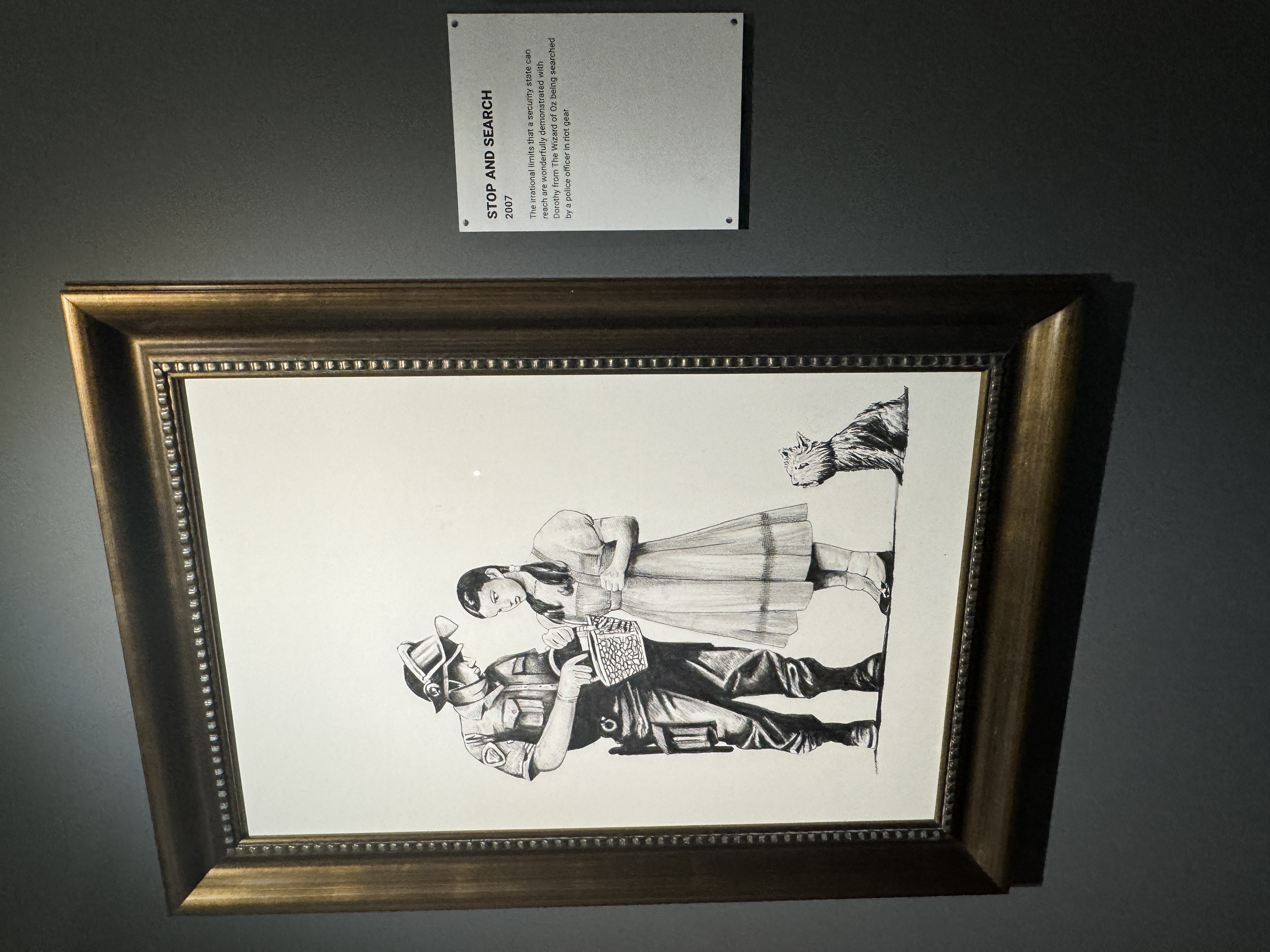 “Stop and Search” portrays a police officer in riot gear searching Dorothy from “The Wizard of Oz.” It’s a commentary on the irrational limits that security can take under the umbrella of safety. This is one of numerous works that illustrate the artist’s strong opinions about policemen and police brutality.
“Stop and Search” portrays a police officer in riot gear searching Dorothy from “The Wizard of Oz.” It’s a commentary on the irrational limits that security can take under the umbrella of safety. This is one of numerous works that illustrate the artist’s strong opinions about policemen and police brutality.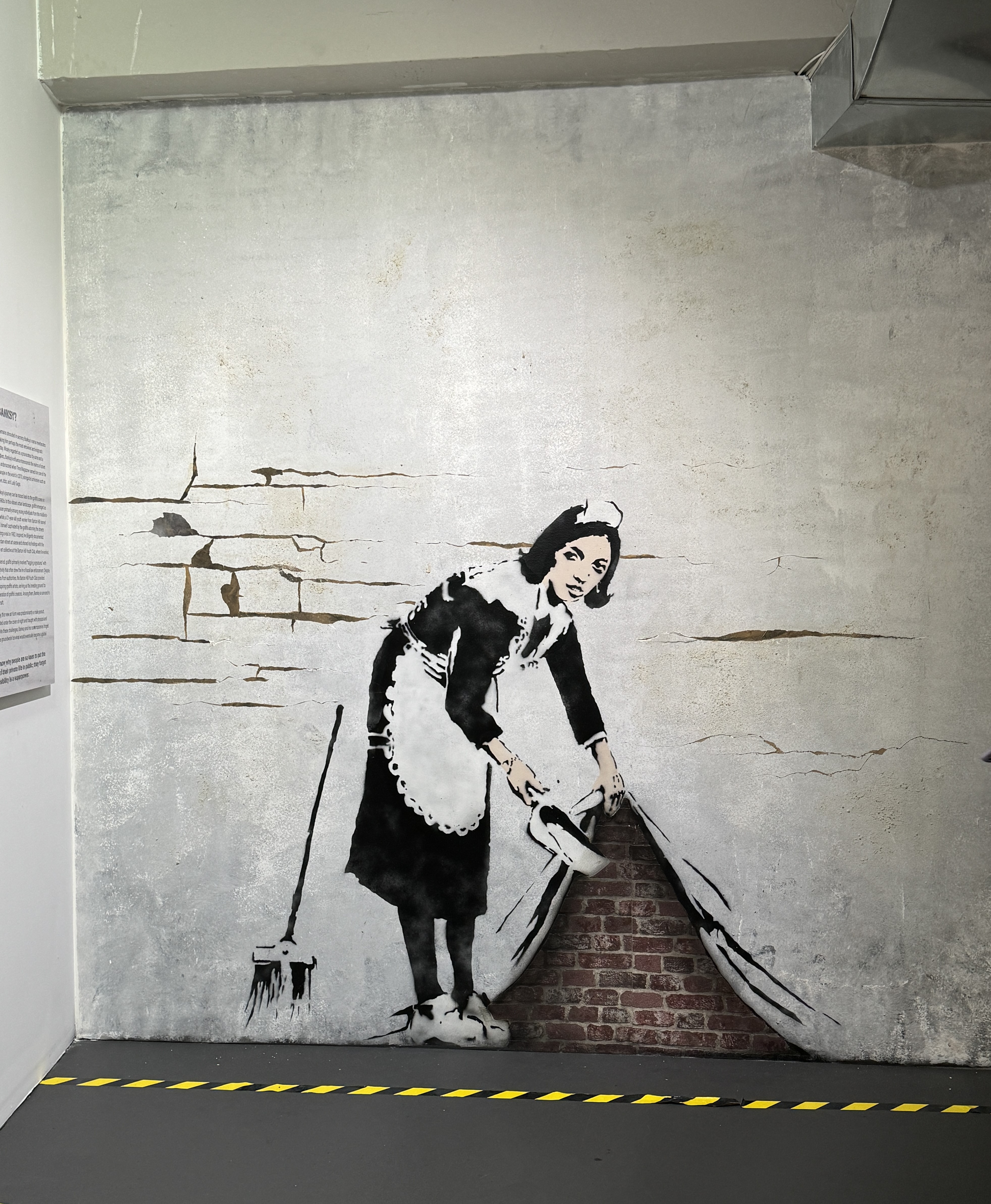 “Sweep it Under the Carpet” portrays a woman dressed as a maid who is sweeping dirt under the cover of a brick wall. This work is seen as a statement on the reluctance of the Western world to deal with important global issues.
“Sweep it Under the Carpet” portrays a woman dressed as a maid who is sweeping dirt under the cover of a brick wall. This work is seen as a statement on the reluctance of the Western world to deal with important global issues.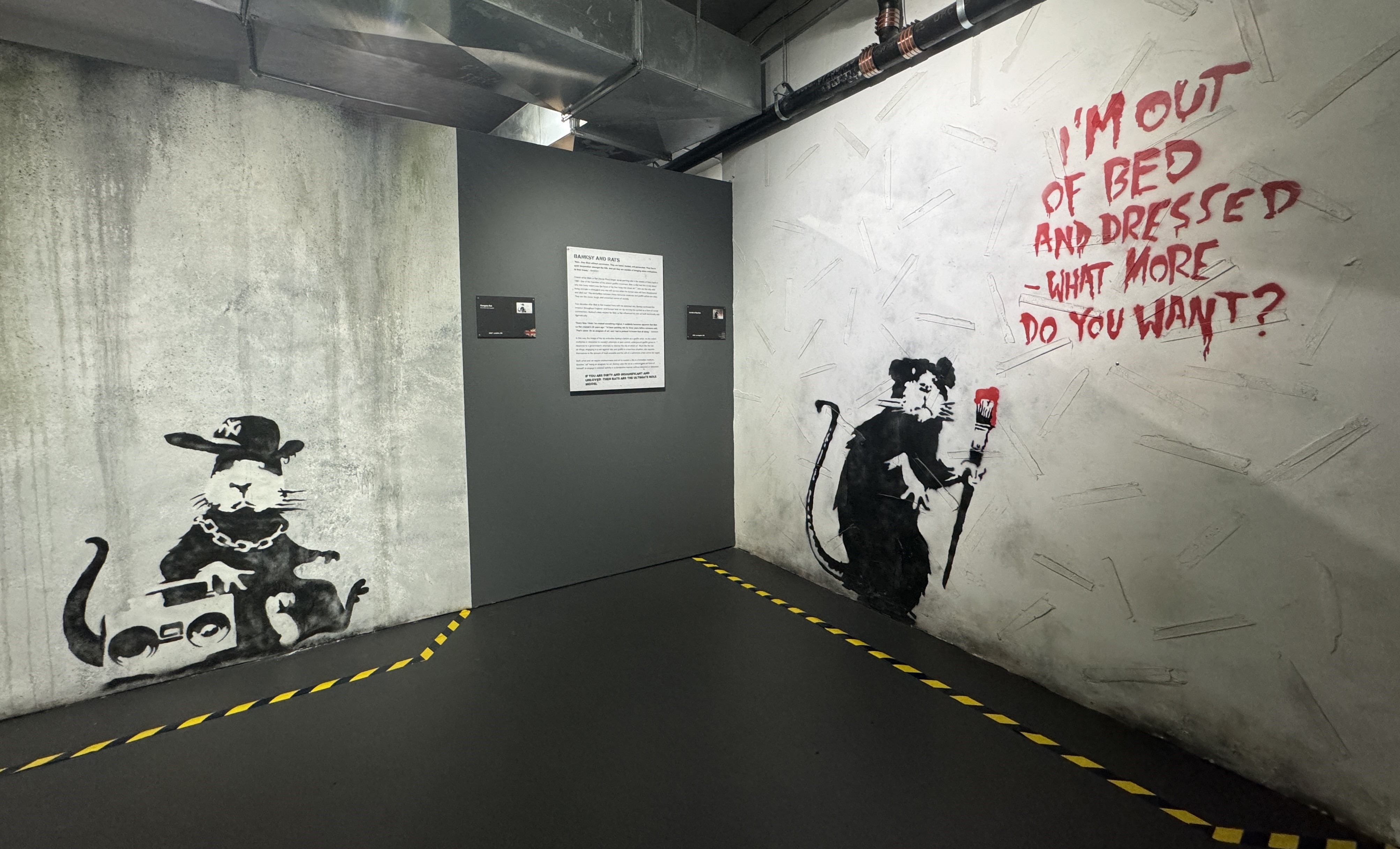 You’ll also notice plenty of rat imagery in the museum, as rats seem to resonate with Banksy. They are one of his greatest sources of inspiration and one of the most prolific subjects in his work. Banksy seems to use the symbol of the rat as a way of positioning himself with the downtrodden whom he speaks on behalf of through his works.
You’ll also notice plenty of rat imagery in the museum, as rats seem to resonate with Banksy. They are one of his greatest sources of inspiration and one of the most prolific subjects in his work. Banksy seems to use the symbol of the rat as a way of positioning himself with the downtrodden whom he speaks on behalf of through his works.
Of rats, he writes, “They exist without permission. They are hated, hunted, and persecuted. They live in quiet desperation amongst the filth. And yet they are capable of bringing entire civilizations to their knees.” He also says, “If you are dirty, insignificant, and unloved, then rats are the ultimate role model.”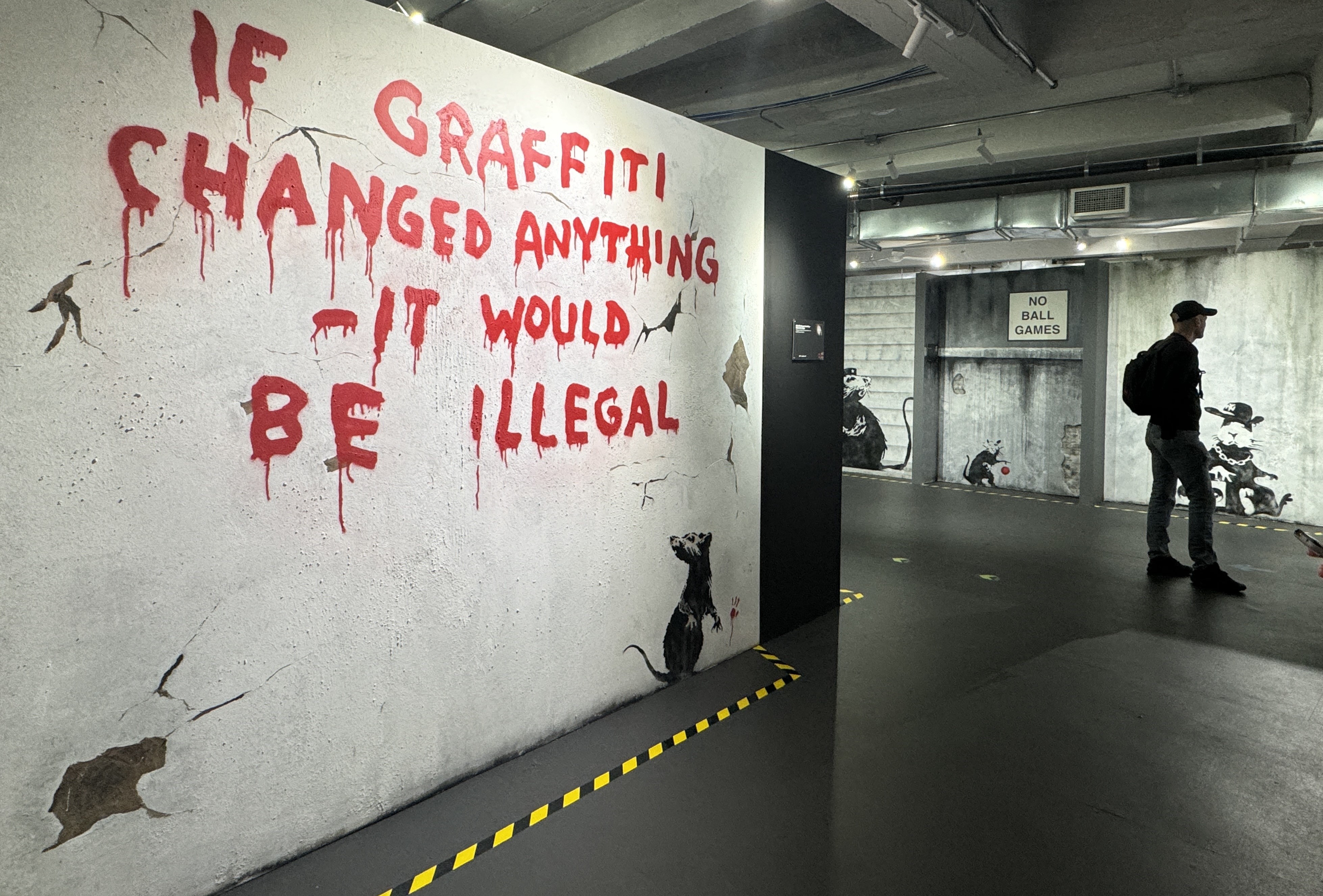 Some of the works depicting rats on display include “No Ball Games,” “Gangsta Rat” and “Out of Bed Rat.” “No Ball Games” features a rat bouncing a ball and taking no notice of the sign above him, which states, “No Ball Games.” He looks directly at you, as if saying, “What are you going to do about it?”
Some of the works depicting rats on display include “No Ball Games,” “Gangsta Rat” and “Out of Bed Rat.” “No Ball Games” features a rat bouncing a ball and taking no notice of the sign above him, which states, “No Ball Games.” He looks directly at you, as if saying, “What are you going to do about it?”
“Gangsta Rat” is the cool guy. He wears a NY Mets baseball cap and a chain necklace and carries a boombox to show he’s hip and fearless. While “Out of Bed Rat” has a look of annoyance, as he holds a paintbrush, having just written the words, “I’m out of bed and dressed – what more do you want?” Many speculate that the artist believes the vast number of people spend their lives doing mundane, joyless activities.
Another piece depicts a rat underneath words in red that say, “If graffiti changed anything, it would be illegal.” Purportedly, this refers to a quote by activist Emma Goldman, who campaigned for women’s rights. She said, “If voting ever changed anything, it would be illegal.”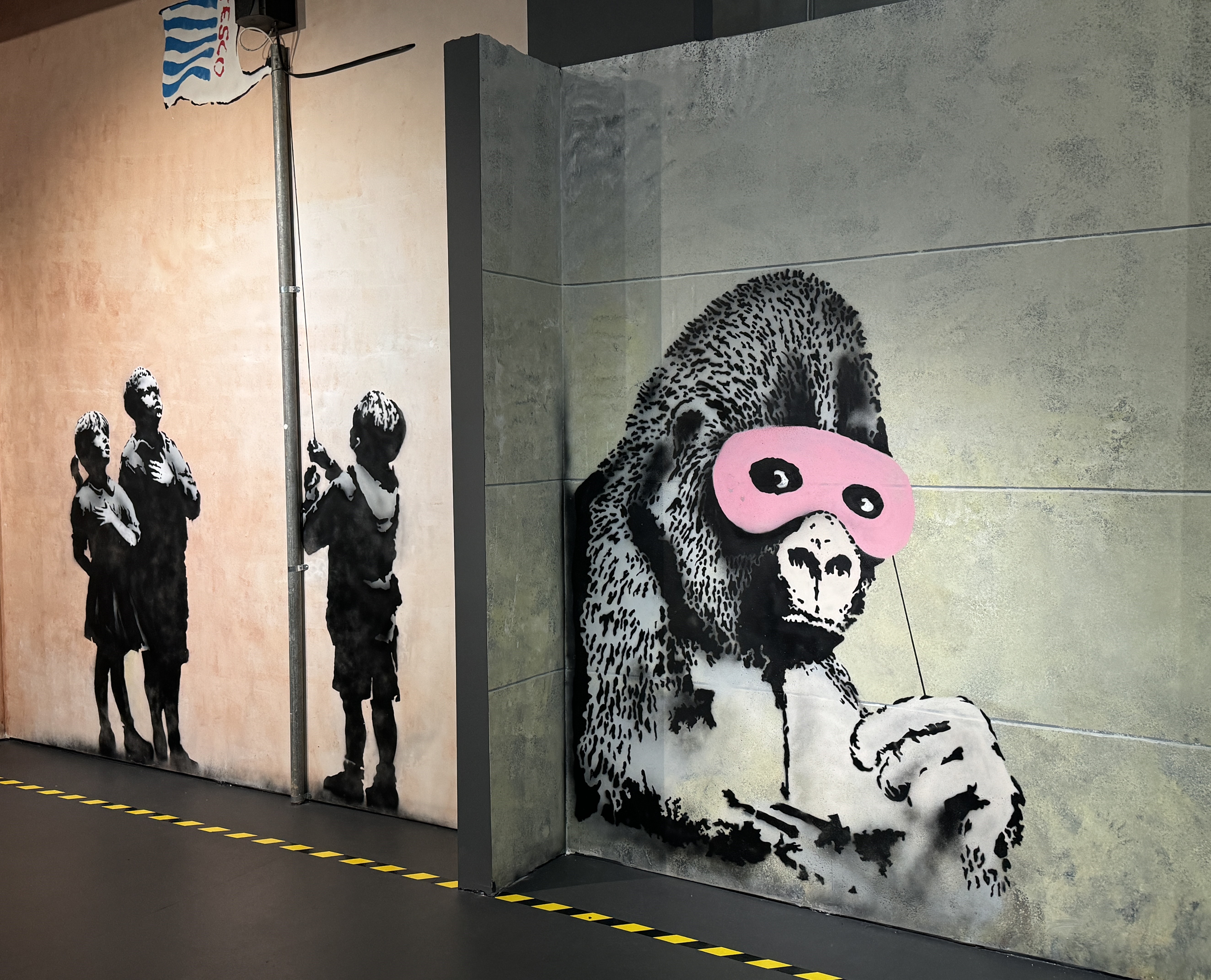 Monkeys are also a recurring motif in Banksy’s works. They can be used to portray famous and everyday people or to criticize power, corruption and consumerism. These creatures are an ideal way for the artist to communicate his often satirical views on humanity.
Monkeys are also a recurring motif in Banksy’s works. They can be used to portray famous and everyday people or to criticize power, corruption and consumerism. These creatures are an ideal way for the artist to communicate his often satirical views on humanity.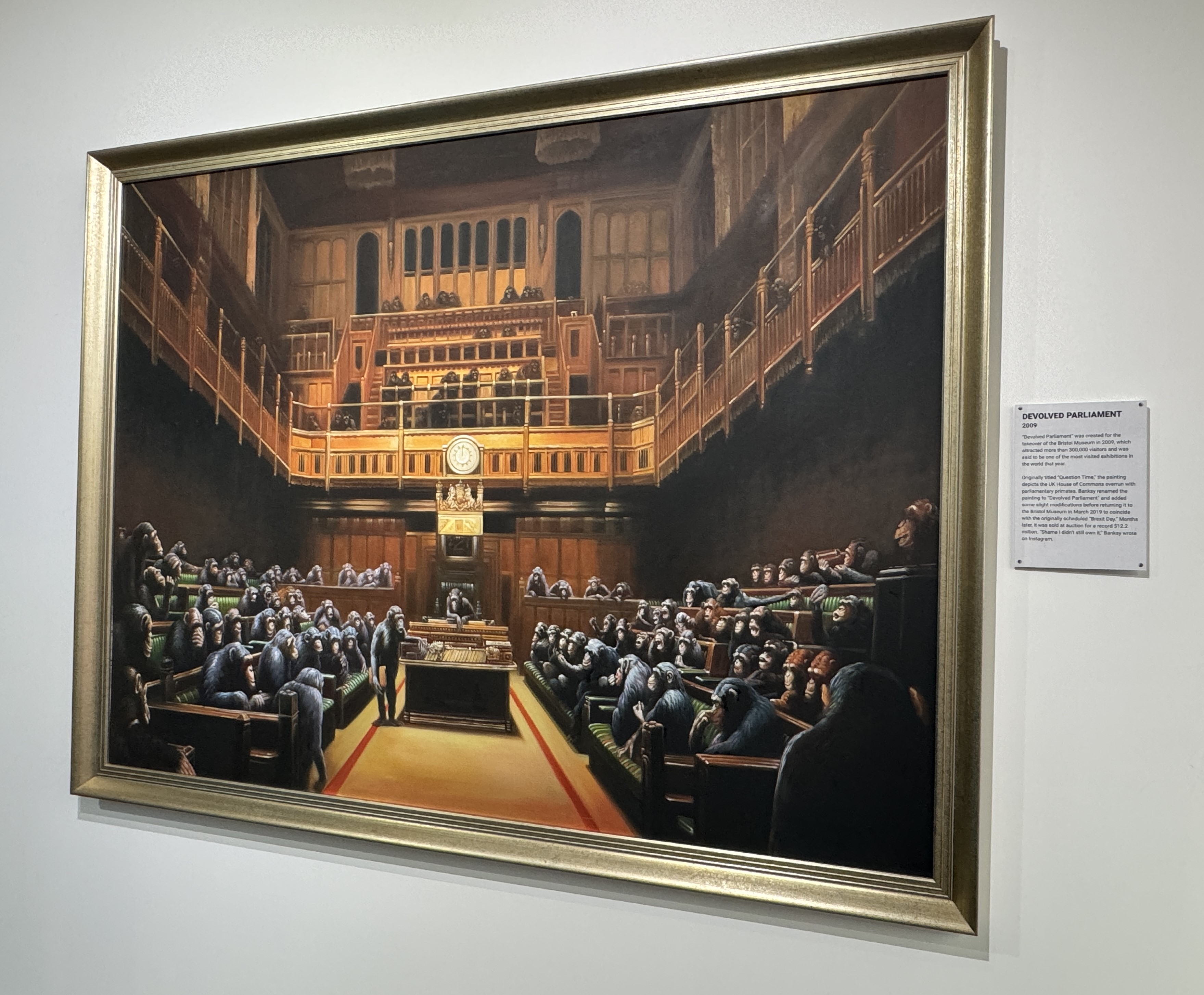 In the oil painting, “Devolved Parliament,” for example, Banksy depicts the Chamber of the House of Commons. However, the chamber is occupied not by Members of Parliament, but by primates. Another, “Gorilla in a Pink Mask” alludes to the way that politicians use their passive voices to disguise their aggressive actions.
In the oil painting, “Devolved Parliament,” for example, Banksy depicts the Chamber of the House of Commons. However, the chamber is occupied not by Members of Parliament, but by primates. Another, “Gorilla in a Pink Mask” alludes to the way that politicians use their passive voices to disguise their aggressive actions.
The museum’s exhibition also incorporates videos and installations. One of the videos of note is of an older man on NYC streets, who is manning a table where unlabeled prints of Banksy art are for sale. He doesn’t get many paying customers, but those that buy something often get a hug thrown in for good measure. By the end of the day, he only earns a few hundred dollars. Little do the customers know, however, that the print they bought cheaply might actually be worth a lot if it were sold in a posh art gallery.
This is a prank ala Banksy, whose stunts are legendary and over the top - like when he orchestrated the self-destruction of one of his prints, “Girl with Balloon,” exactly when a famed auction house announced it had just sold for $1.4 million. A few years later, the now mostly shredded work, retitled, “Love is in The Bin,” sold for a staggering $24.5 million, a record for the artist. 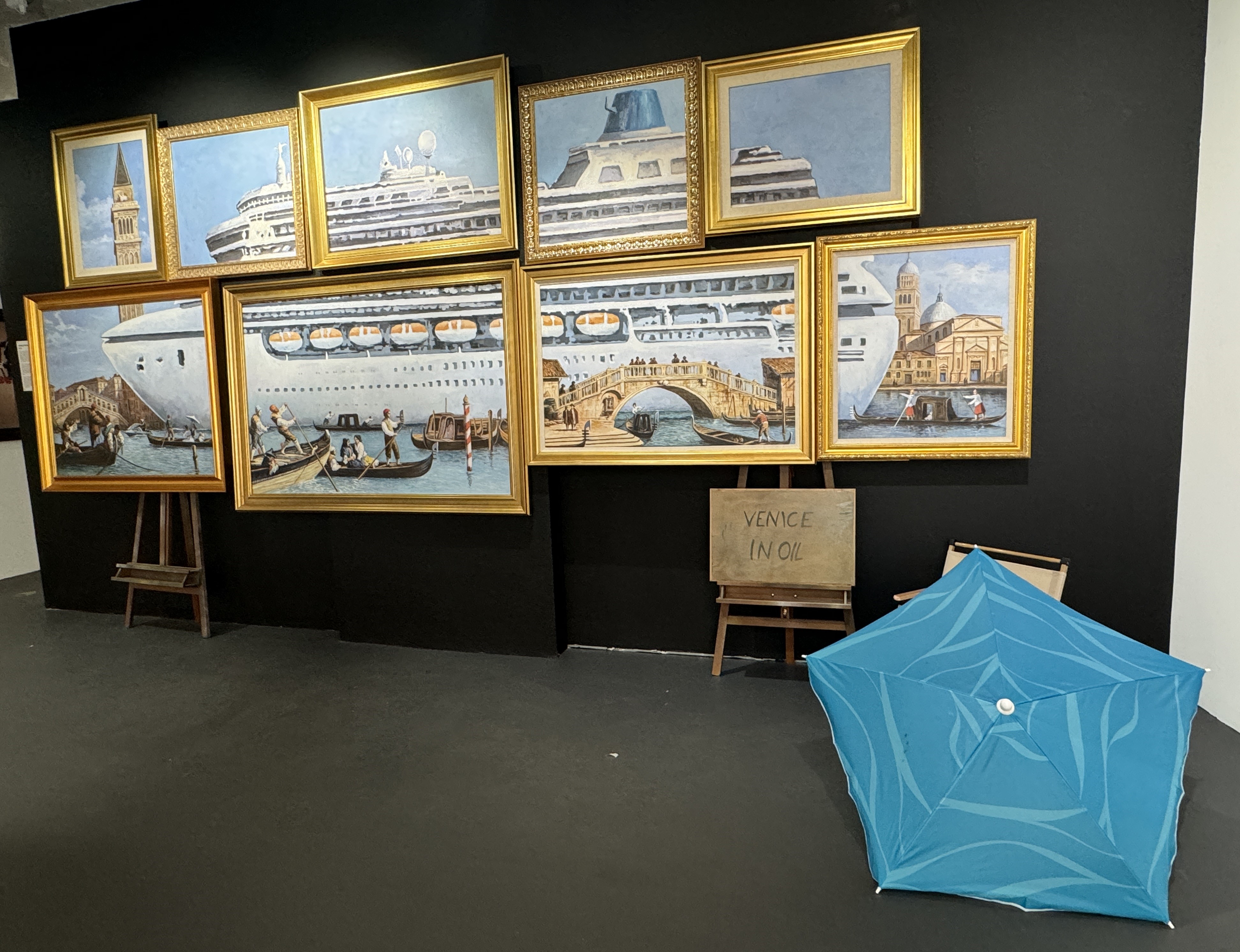 Though Banksy is best known for his graffiti, he also paints on canvas. Excluded from the Venice Biennale in 2019, he set up a stall in St. Mark’s Square displaying his “Venice in Oil” paintings. This series of paintings, which have been re-created for the museum, are assembled on easels. They depict a cruise ship crowding out gondolas on a canal. The title refers to the oil paint itself and the oil from the “floating cities” that clog up the waterways.
Though Banksy is best known for his graffiti, he also paints on canvas. Excluded from the Venice Biennale in 2019, he set up a stall in St. Mark’s Square displaying his “Venice in Oil” paintings. This series of paintings, which have been re-created for the museum, are assembled on easels. They depict a cruise ship crowding out gondolas on a canal. The title refers to the oil paint itself and the oil from the “floating cities” that clog up the waterways.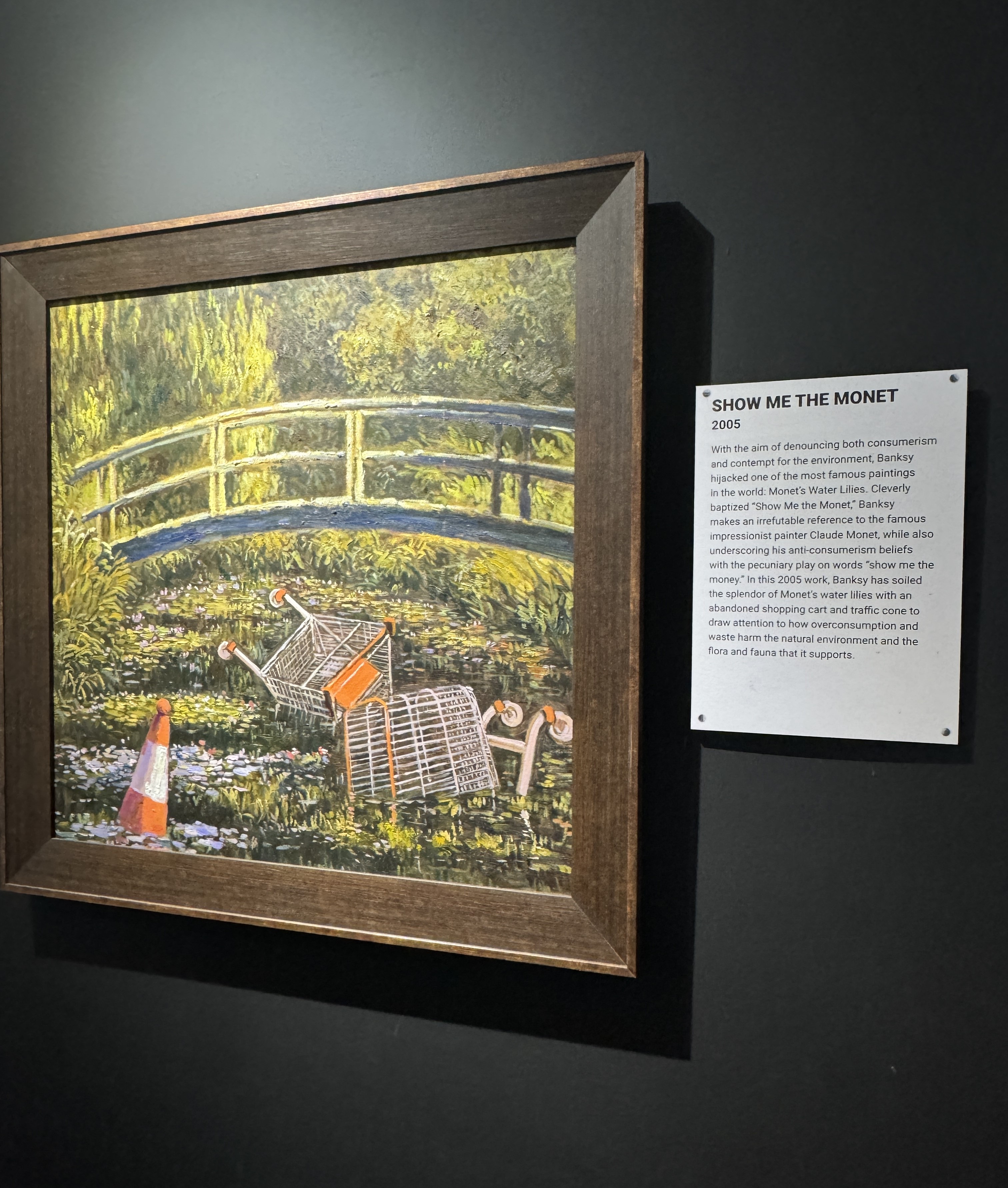 In “Show me the Monet,” Banksy repurposes artist Claude Monet’s iconic image of the Japanese bridge in his water garden at Giverny. He adds in an orange traffic cone and shopping cart, thus disrupting the lush romanticism of this Impressionist masterpiece. It’s a statement directed towards the environment and capitalism.
In “Show me the Monet,” Banksy repurposes artist Claude Monet’s iconic image of the Japanese bridge in his water garden at Giverny. He adds in an orange traffic cone and shopping cart, thus disrupting the lush romanticism of this Impressionist masterpiece. It’s a statement directed towards the environment and capitalism.
In the final area of the exhibit, you’ll see a re-creation of a room in the subversive, real-life accommodation option, “Walled Off Hotel.” This boutique hotel, located in Bethlehem, was designed by Banksy, along with other creatives, to foster peace in the West Bank.
The hotel was established in 2017 and originally, it was intended to be a temporary exhibition. But the hotel attracted much attention and visitors, who flocked to see it and to stay there. Its location is opposite the portion of the Israeli West Bank Barrier, separating Bethlehem from the holy site of Rachel’s Tomb. And it’s billed as having the “worst view of any hotel in the world.” While the real hotel is currently closed, this re-created room carries its intended geopolitical message.
www.museumbanksy.com






















